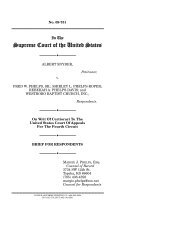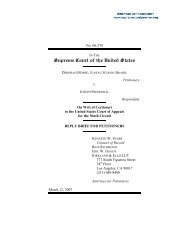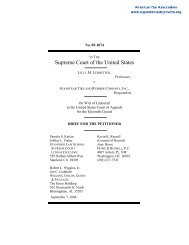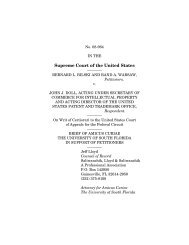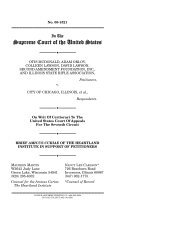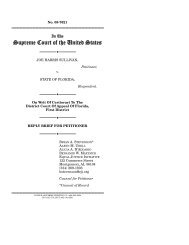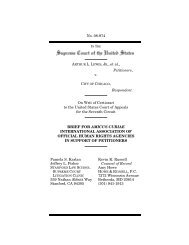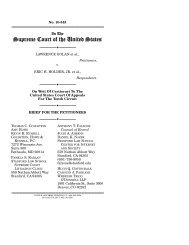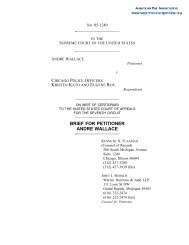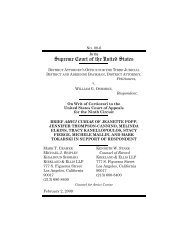Brief of respondent for Florida v. Powell, 08-1175 - Oyez
Brief of respondent for Florida v. Powell, 08-1175 - Oyez
Brief of respondent for Florida v. Powell, 08-1175 - Oyez
You also want an ePaper? Increase the reach of your titles
YUMPU automatically turns print PDFs into web optimized ePapers that Google loves.
45<br />
the right to counsel “be<strong>for</strong>e” or “prior to” interrogation<br />
to be misleading. They also ignore the real world<br />
reality that warnings are not given in com<strong>for</strong>table<br />
surroundings where a suspect can parse the words in<br />
the manner employed by Petitioner and the Solicitor<br />
General. Rather, “[a]n individual swept from familiar<br />
surroundings into police custody, surrounded by<br />
antagonistic <strong>for</strong>ces, and subjected to the techniques <strong>of</strong><br />
persuasion . . . cannot be otherwise than under<br />
compulsion to speak.” Miranda, 384 U.S. at 461. 14<br />
Second, Petitioner and the Solicitor General<br />
argue that – because the last sentence <strong>of</strong> the <strong>for</strong>m<br />
read to <strong>Powell</strong> stated that “[y]ou have a right to use<br />
any <strong>of</strong> these rights at any time you want during this<br />
interview” – “[t]hat warning eliminated any inference<br />
that counsel could not be present after the interview<br />
commenced.” SG Br. 26; accord Br. 8, 18. This was<br />
easily answered by the <strong>Florida</strong> Supreme Court:<br />
14<br />
Like Petitioner, the Solicitor General argues that it is<br />
inappropriate to “[f ]ocus[ ] on the precise wording <strong>of</strong> the<br />
warning at the expense <strong>of</strong> their substance.” SG Br. 15. Yet the<br />
Solicitor General’s brief engages in exactly that sort <strong>of</strong><br />
<strong>for</strong>malistic argument. It closely parses the words <strong>of</strong> the warning<br />
and claims that the phrase “be<strong>for</strong>e answering any <strong>of</strong> our<br />
questions” clearly conveys that a suspect could request a lawyer<br />
be<strong>for</strong>e each <strong>of</strong> the police’s questions during the course <strong>of</strong> the<br />
interrogation. SG Br. 23. The Solicitor General’s argument<br />
depends on the <strong>for</strong>malistic premise that “be<strong>for</strong>e answering any<br />
<strong>of</strong> our questions” does not have the same meaning as “be<strong>for</strong>e any<br />
questioning” or “be<strong>for</strong>e questioning.” SG Br. 23, 26. In the rush to<br />
analyze the warning word-<strong>for</strong>-word, the Solicitor General ignores<br />
that Petitioner repeatedly characterized that part <strong>of</strong> the warning as<br />
being equivalent to “be<strong>for</strong>e questioning.” See, e.g., Br. 6, 10, 18.



